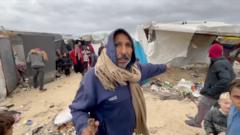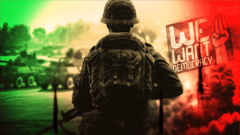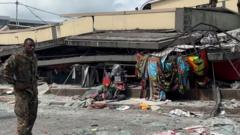Thousands of Palestinians displaced by war in Gaza struggle to survive as winter progresses, living in makeshift tents along the coastline with limited access to food, medicines, and adequate shelter. The humanitarian situation is dire, prompting UN officials to describe conditions as catastrophic.
Gazans Face Winter Hardships Amid Ongoing Displacement

Gazans Face Winter Hardships Amid Ongoing Displacement
As winter approaches, displaced Gazans endure harsh weather conditions with minimal shelter, food shortages, and health crises exacerbated by ongoing conflict.
The beaches of Gaza, once a place for leisure, are now home to tens of thousands who have fled their residences due to relentless conflict. Among them is Mohammed al-Halabi, whose life reflects the suffering many face. "Nothing is left in the tent: not mattresses, bedding, bread, everything was taken. The sea took it," he lamented from Deir al-Balah. Reports indicate that nearly the entire population of 2.3 million in Gaza is now displaced, with a staggering nine in ten relying on tents for shelter, according to the United Nations.
As temperatures continue to drop, illnesses are on the rise. Shaima Issa from Khan Younis shared, "My children’s feet, their heads—everything is freezing... Everyone here is sick and coughing." Her neighbor, Salwa Abu Nimer, echoed the distress of many with her tearful account of living in flooded conditions without proper shelter. "No flour, no food, no drink, no shelter,” she cried, showcasing the desperate plight faced by families in the area.
Overall conditions are particularly dire in northern Gaza, leading UN officials to warn of extreme shortages in food, medicine, shelter, and fuel. Long lines form outside bakeries as residents scramble for essentials, a situation starkly illustrated by Hanan al-Shamali's struggle to obtain bread while managing health issues. “I need a loaf of bread... In the end, do I get bread or not?” she pleaded, signifying the dire competition for dwindling resources.
Despite goods arriving from Israel via the Kerem Shalom crossing, aid remains critically low, with distribution hampered by challenges faced by humanitarian organizations. According to Shimon Freedman, spokesman for Cogat, part of the Israeli military, “the biggest backlog for humanitarian aid is the distribution capabilities of the international organisations.”
Conversely, local humanitarian workers express concerns over increased lawlessness, with armed gangs reportedly looting incoming supplies, compelling the UN Relief and Works Agency (UNRWA) to pause its deliveries through this route. As Antoine Renard, head of the UN’s World Food Programme in Gaza, articulated, the current state presents "a daily struggle for survival," with levels of hunger and destruction surpassing previous crises.
As winter sets in, the reality is bleak: the already fragile status in Gaza faces further deterioration. The ongoing war shows no signs of resolution, leaving its residents anticipating even greater suffering in the harsh months ahead.





















